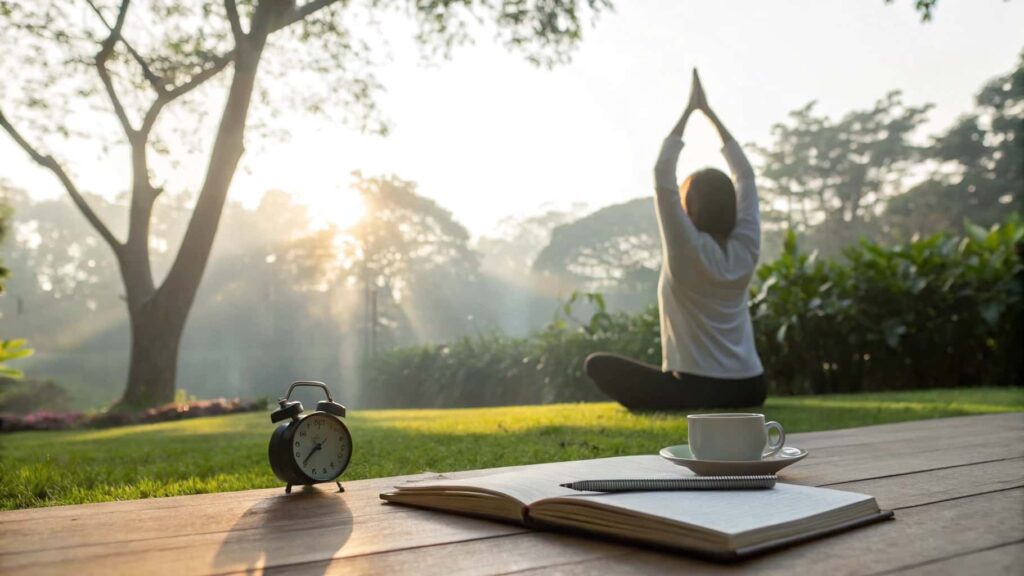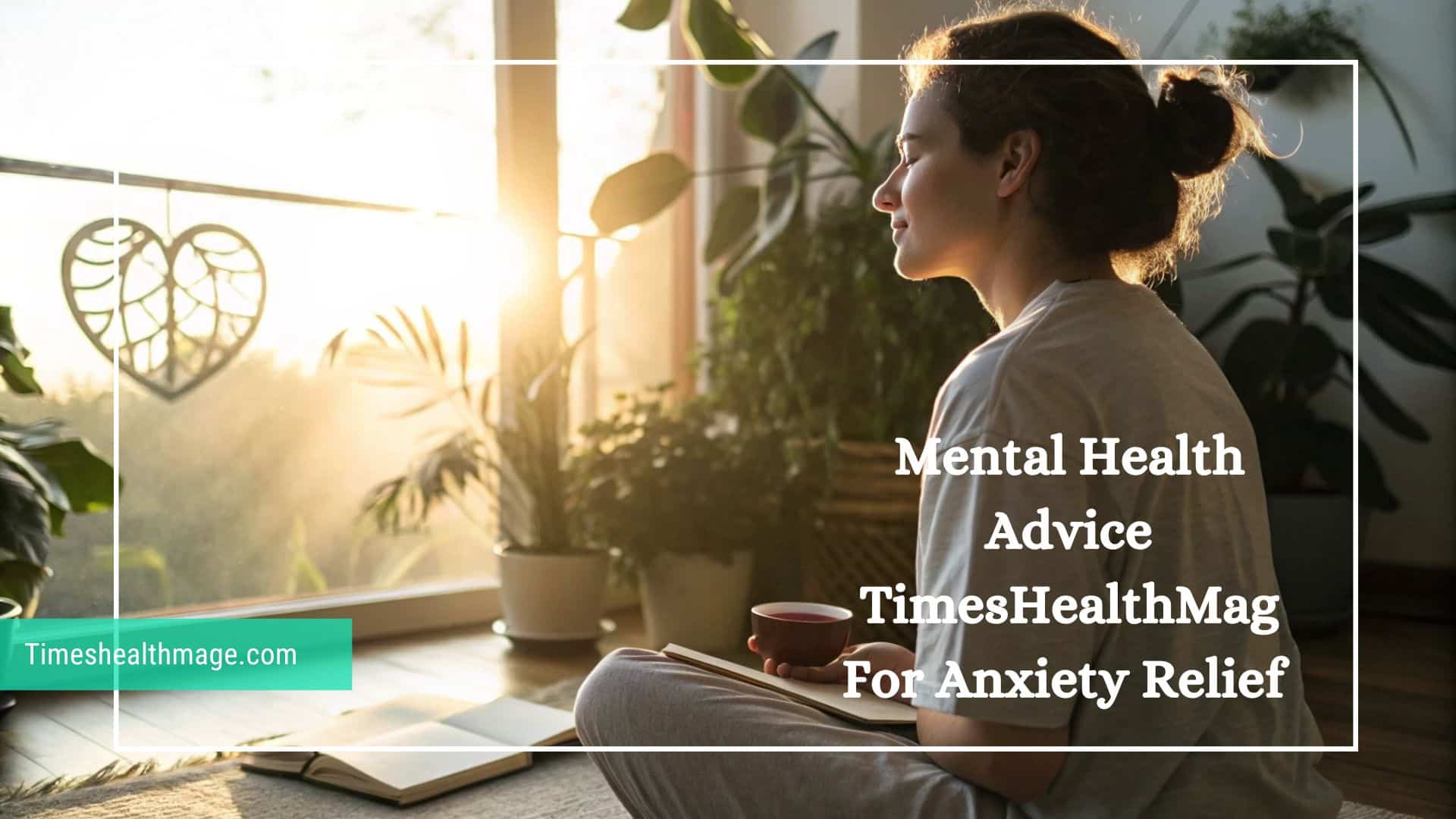Anxiety disorders have become increasingly prevalent in today’s high-paced, digitally driven world. Whether triggered by work pressure, social anxiety, uncertainty, or traumatic events, anxiety can interfere with daily life and overall well-being. If you’ve found yourself searching for mental health advice TimesHealthMag for anxiety relief, you’re not alone. With rising awareness, platforms like TimesHealthMag have become pivotal in providing expert-backed, practical, and holistic strategies to help manage anxiety effectively.
This article explores a wide range of evidence-based approaches, cutting-edge mental health advice, and fresh perspectives on reducing anxiety symptoms. We’ll walk you through the strategies supported by modern research, give you a clearer understanding of how anxiety works, and offer you actionable steps to take control of your mental well-being.
What Is Anxiety And Why Does It Affect So Many People?
Anxiety is a psychological and physiological response to stress, uncertainty, or perceived danger. While occasional anxiety can be a motivating force, persistent and excessive worry can lead to disorders that disrupt daily life. It manifests through physical symptoms (such as rapid heartbeat and muscle tension) and emotional symptoms (like persistent worry or restlessness). Multiple factors influence anxiety susceptibility:

- Genetic predisposition: Family history may increase risk.
- Life experiences: Trauma, abuse, or neglect can trigger lasting anxiety.
- Personality traits: Perfectionism and low self-esteem may be contributing factors.
- Biological factors: Imbalances in neurotransmitters like serotonin or GABA can affect mood regulation.
- Chronic stress: Prolonged stress from work, school, or personal relationships can heighten anxiety levels.
Understanding the multifaceted nature of anxiety helps tailor holistic relief strategies.
Why Trust Mental Health Advice From TimesHealthMag?
TimesHealthMag offers mental health guidance that is rooted in research and simplified for everyday use. It shares expert-backed advice that’s easy to apply and proven to work for many people. Articles are written clearly, making complex ideas easy to understand for everyone.
- Expert-Reviewed and Research-Based: Each article is based on current psychological research and reviewed by mental health professionals. This means the tips are reliable, scientifically sound, and safe to follow. Readers can trust the advice without worrying about harmful suggestions.
- Covers All Aspects of Mental Health: The magazine includes mental, emotional, physical, and lifestyle factors. This complete approach helps readers feel better in every part of their life. It ensures long-term improvement rather than just short-term fixes.
- Simple and Clear Language: Tips and guides are written in everyday words that anyone can understand. This helps people take action without feeling confused or overwhelmed. The goal is to make mental wellness easy to practice.
- Updated with New Research: TimesHealthMag constantly refreshes its articles to stay current with mental health science. This means you are always getting the latest tips and strategies. It helps readers stay informed and ahead in their self-care.
- Trusted by a Wide Audience: Thousands of readers follow the magazine for reliable wellness content. Positive feedback and community trust prove its value. People find comfort in knowing others benefit from the same advice.
Whether you’re just beginning your mental wellness journey or looking for ways to strengthen your routine, TimesHealthMag provides trusted, easy-to-follow support.
How Physical Activity Helps Reduce Anxiety?
Engaging in physical activity is one of the most effective natural ways to reduce anxiety. Regular exercise helps release feel-good chemicals in the brain like endorphins, serotonin, and dopamine. These chemicals improve mood, increase energy levels, and help reduce stress over time. Exercise also reduces the levels of stress hormones such as cortisol, making you feel more relaxed and in control. It improves sleep quality, which is often disrupted by anxiety, and helps maintain a healthy brain through enhanced neuroplasticity. When the body becomes stronger, the mind also builds resilience to stress. Incorporating even light movement into your day can make a noticeable difference in how you feel.
According to TimesHealthMag, different forms of physical activity benefit anxiety in different ways:
- Aerobic workouts: Activities like running, biking, and swimming increase heart rate and trigger chemical changes in the brain that enhance mood.
- Strength training: Weightlifting and resistance exercises help release built-up tension in the muscles and promote confidence.
- Mind-body activities: Yoga, tai chi, and Pilates combine movement with breathing and mindfulness, which lowers stress and improves focus.
Building a routine of 20–30 minutes of physical activity most days of the week is recommended. Choose activities you enjoy so you’re more likely to stay consistent. Whether it’s walking your dog, dancing, or hitting the gym, movement can become your medicine for anxiety relief.
The Role Of Mindfulness In Anxiety Relief – Proven Ways To Reduce Stress!
Mindfulness is a powerful mental practice that involves paying attention to the present moment without judgment. It encourages individuals to be aware of their thoughts, emotions, and bodily sensations as they happen, helping them respond rather than react to stress. According to TimesHealthMag, mindfulness can significantly reduce anxiety by quieting the mental noise that often drives worry and fear.
When practiced regularly, mindfulness improves emotional regulation, builds self-awareness, and fosters a calm and focused mind. It shifts your attention from what might go wrong to what is actually happening right now. This kind of mental shift can make daily challenges feel more manageable and less overwhelming. Even a few minutes a day can create noticeable benefits over time.
Deep Breathing Techniques That Work – Easy Ways To Calm Anxiety Fast!
Breathing is our most accessible tool for calming the nervous system. TimesHealthMag highlights the power of breathwork to counteract anxiety by activating the parasympathetic nervous system. Key techniques include:
- Box Breathing teaches you to breathe in, hold, breathe out, and hold again for four seconds each. This balanced rhythm helps calm your mind and control your body’s reactions. It’s great for moments of panic or stress.
- Diaphragmatic Breathing uses your belly instead of your chest to take deep breaths. This allows more oxygen to enter your lungs and makes each breath more effective. It helps lower your heart rate and ease tension.
- Alternate Nostril Breathing involves breathing in through one nostril and out through the other. This technique balances the left and right sides of your brain, bringing clarity and calm. It’s especially helpful before sleep or big events.
- 4-7-8 Breathing is where you breathe in for 4 seconds, hold for 7, and breathe out for 8. It slows your breathing pattern, promoting relaxation and reducing anxious feelings. Many people find it helps them fall asleep faster too.
- Equal Breathing focuses on making the inhale and exhale the same length. This steady pattern trains your body to stay calm under pressure. It’s easy to learn and perfect for beginners.
Deep breathing techniques are easy to learn and work well with other methods like mindfulness or exercise. Practicing them daily creates a strong foundation for mental peace and emotional strength.
Can Nature And Pets Really Help With Anxiety?
Spending time in nature or with pets can be a powerful way to reduce anxiety and find peace. TimesHealthMag explains that being in natural surroundings helps lower stress hormones like cortisol and boosts serotonin, which improves mood and emotional stability. When you walk through a park, garden, or forest, your senses become engaged with fresh air, green sights, and calming sounds, creating a grounding experience that shifts your focus away from anxious thoughts.
Likewise, spending time with pets—whether playing, cuddling, or even just watching them—can offer unconditional companionship and emotional comfort. Animals can make you feel loved and needed, which builds emotional strength. Simple moments like petting a dog or watching birds outside can help you feel more relaxed and connected to the present. These small experiences in nature or with pets become gentle, everyday ways to find relief from anxiety.
How Can You Establish A Mental Health Routine That Works?
Creating a sustainable mental health routine helps anchor your emotional well-being in daily habits. Here are five core elements you can integrate into your lifestyle:

Set a Consistent Sleep Schedule:
Sleep is foundational to mental health. Aim to go to bed and wake up at the same time every day—even on weekends. This helps regulate your body’s circadian rhythm, stabilizes mood, and reduces irritability caused by sleep deprivation.
Prioritize Daily Movement:
Incorporate at least 20 to 30 minutes of physical activity into your daily routine. It doesn’t have to be intense—walking, yoga, or light stretching count. Physical movement releases endorphins that improve your mood and counteract stress.
Practice Mindfulness or Meditation:
Dedicate 5–10 minutes each day to mindfulness, meditation, or deep breathing. Doing this consistently calms your nervous system, improves focus, and makes it easier to manage negative thoughts. Over time, mindfulness becomes a powerful buffer against anxiety.
Schedule Regular Check-ins With Yourself:
Take time each day to reflect on your emotional state, thoughts, and stress levels. Journaling or using a mood tracker can help you understand triggers and patterns. These insights can guide adjustments in your routine and promote emotional resilience.
Limit Exposure to Digital Overload:
Set clear boundaries with social media, news, and device notifications. Unplugging for even an hour a day allows your brain to rest and prevents overstimulation. Replacing screen time with reading or being outdoors supports a more relaxed, grounded mindset.
What Is The Power Of Social Support And Open Communication?
Social support plays a crucial role in protecting against the effects of anxiety and promoting emotional resilience. When individuals share their feelings with trusted friends, family members, or mental health professionals, it helps reduce emotional burden and builds connection. Open communication creates a safe space for validation, understanding, and problem-solving.
Knowing that someone genuinely listens and cares can reduce feelings of isolation and helplessness. It also encourages the development of emotional intelligence and coping strategies, which are vital in navigating stress. TimesHealthMag emphasizes the importance of fostering supportive relationships and community, especially in times of crisis. In essence, meaningful conversations can be therapeutic, helping individuals process thoughts and transform vulnerability into strength.
How Alcohol And Substance Use Affect Anxiety?
Substances like alcohol and drugs may offer temporary relief but worsen anxiety long-term. TimesHealthMag warns that:
- Disrupts Brain Chemistry: Alcohol and drugs interfere with the balance of neurotransmitters like serotonin and dopamine. These chemicals play a key role in regulating mood and anxiety. When disrupted, they can worsen symptoms and increase emotional instability.
- Creates a Cycle of Dependence: Many people turn to substances for temporary relief from anxiety. But over time, the body builds a tolerance, requiring more to achieve the same effect. This leads to dependency and deeper emotional struggles when the substance wears off.
- Increases Physical Symptoms: Alcohol and stimulants like caffeine can cause side effects such as rapid heartbeat, shakiness, and nausea. These physical symptoms often mimic or worsen anxiety, making it harder to distinguish between cause and effect.
- Affects Sleep Quality: Substance use, especially alcohol, disrupts sleep patterns by reducing REM sleep and causing frequent wake-ups. Poor sleep increases irritability, fatigue, and overall stress levels, all of which heighten anxiety.
- Impairs Judgment and Coping Skills: When under the influence, your ability to make clear decisions or manage stress is significantly reduced. This can lead to risky behaviors and increase emotional regret or embarrassment, fueling more anxiety afterward.
- Blocks Long-Term Healing: Substance use masks symptoms rather than addressing the root cause of anxiety. Avoiding proper mental health care and therapy can delay healing and worsen the condition over time. Real recovery requires facing emotions, not numbing them.
A healthy coping mechanism always outweighs short-term numbing.
Using Cognitive Techniques To Reframe Anxiety – How To Change Your Mindset!
Cognitive techniques are helpful tools for changing the way you think about anxiety and stressful situations. TimesHealthMag explains that when you learn to spot negative thoughts, you can challenge them and replace them with more positive or realistic ones. This helps you feel more in control and less overwhelmed by fear or worry. One simple method is thought journaling, where you write down your anxious thoughts and ask yourself if they are really true.
This process helps you see things from a different point of view and calm your reactions. Another helpful technique is asking gentle questions like, “What’s the worst that could happen?” or “Is there another way to see this?” These questions help reduce panic and bring clarity. Over time, your brain gets used to thinking in a more balanced and less fearful way. Practicing these methods regularly builds emotional strength and can make anxiety easier to manage in everyday life.
When To Seek It And What To Expect? – Professional Help!
If anxiety interferes with work, relationships, or health, professional support is crucial. Therapy options include:
When Anxiety Disrupts Daily Life:
If your anxiety starts to affect your sleep, relationships, or work, it’s time to talk to a professional. These disruptions can signal that your symptoms are beyond what self-help methods can manage. Getting help early can prevent further emotional distress.
When Self-Help Isn’t Enough:
If you’ve tried meditation, exercise, journaling, and other strategies but still feel overwhelmed, professional support is essential. Therapists are trained to help you dig deeper into your thoughts and emotions. They can guide you toward long-lasting solutions.
When You Experience Physical Symptoms:
Persistent headaches, stomach issues, racing heart, or panic attacks are signs that anxiety is affecting your body. Mental health professionals understand how anxiety manifests physically and can help address it holistically. They may also coordinate with medical doctors if needed.
When You Feel Hopeless or Depressed:
If you feel stuck, helpless, or emotionally numb, don’t wait to seek help. These could be signs of depression alongside anxiety. Professional therapy provides a safe place to explore these feelings and learn effective ways to cope.
What to Expect from a Therapist:
Your first session usually includes questions about your symptoms, life history, and goals. You don’t need to have all the answers—just showing up is the first step. Over time, therapy helps you develop coping tools, gain insight, and improve your emotional resilience.
Tech And Tools – Can Digital Mental Health Aids Help?
Yes, digital mental health tools can play a significant role in supporting anxiety relief. Mobile apps for meditation, mood tracking, CBT-based exercises, and guided journaling have made self-help resources more accessible than ever. Virtual therapy platforms also allow individuals to connect with licensed professionals from the comfort of their homes.
Many of these tools are backed by clinical research and designed to reinforce healthy habits, emotional awareness, and coping strategies. TimesHealthMag often highlights the effectiveness of tech-based interventions for those hesitant or unable to attend in-person sessions. While they are not a replacement for professional treatment, these digital aids can complement traditional therapy and provide day-to-day support in managing anxiety.
How Nutrition Plays A Role In Managing Anxiety?
Diet influences brain function and stress regulation. Recommendations from TimesHealthMag include:
| Nutritional Element | Impact on Anxiety Relief |
|---|---|
| Omega-3 Fatty Acids | Found in fish and flaxseeds, these support brain function and reduce inflammation that may worsen anxiety. |
| Complex Carbohydrates | Whole grains help regulate blood sugar and promote serotonin production, which stabilizes mood. |
| Magnesium-Rich Foods | Nuts, seeds, and leafy greens help relax the nervous system and reduce stress levels. |
| Probiotics and Gut Health | Yogurt and fermented foods support the gut-brain connection, influencing emotional well-being. |
| Hydration | Drinking enough water daily prevents fatigue and mood swings caused by dehydration. |
| Limiting Caffeine & Sugar | Reducing intake helps avoid spikes in energy that can trigger jitteriness and anxiety. |
Can Music And Creative Outlets Boost Your Mental Health?
Engaging in creative outlets like music, art, writing, or dance offers powerful therapeutic benefits for those managing anxiety. Music, in particular, has been shown to lower cortisol levels and stimulate brain regions linked to reward and emotional processing. Whether you’re playing an instrument, listening to calming playlists, or singing your favorite song, music can create a safe emotional release.
Creative activities give the mind a break from stressors and offer a constructive way to process feelings. They also promote flow states—moments of deep focus that quiet anxious rumination. Many therapists now integrate creative expression into treatment plans because it encourages self-discovery, reduces tension, and fosters joy. These tools are especially helpful for people who struggle to verbalize their emotions but still need a healthy way to express them.
Sleep And Its Profound Impact On Anxiety Levels – Improve Your Mental Health Today!
Sleep is a cornerstone of mental health, and its relationship with anxiety is deeply interconnected. Lack of quality sleep can increase cortisol levels, the stress hormone that intensifies anxious thoughts and physical tension. Disrupted sleep patterns may impair your ability to regulate emotions, leading to irritability and heightened sensitivity to daily stressors.
On the flip side, anxiety often causes racing thoughts and restlessness that prevent deep, restorative rest—creating a vicious cycle. Studies show that those with chronic insomnia are significantly more likely to develop anxiety disorders. Building a consistent sleep schedule, limiting screen time before bed, and creating a relaxing pre-sleep routine can dramatically improve both sleep quality and anxiety management.
Is Gratitude A Practical Tool For Anxiety Relief?
Gratitude journaling can rewire the brain to focus on positivity. Techniques include:

- Shifts Focus to Positivity: Practicing gratitude helps shift your attention away from fear and worry. By focusing on what’s going well, your brain becomes less focused on perceived threats. This mental shift reduces the power of anxious thoughts.
- Encourages Mindfulness: Gratitude grounds you in the present moment. When you take time to notice and appreciate what you have, it keeps your mind from spiraling into past regrets or future fears. This promotes a calmer, more centered mindset.
- Boosts Mood and Resilience: Grateful people often experience higher levels of happiness and emotional resilience. The practice increases dopamine and serotonin, both of which are important for mental health. Over time, this creates a more stable emotional foundation.
- Improves Sleep Quality: Writing in a gratitude journal before bed can calm your mind and lead to deeper sleep. By ending the day on a positive note, your brain feels less threatened and more at ease. Better sleep further supports anxiety reduction.
- Enhances Relationships: Gratitude strengthens your connection with others. Saying thank you or acknowledging someone’s help builds trust and emotional safety. These strong relationships act as a buffer against stress and anxiety.
This subtle practice reduces anxiety by shifting mental focus from scarcity to abundance.
FAQs:
What types of anxiety relief advice does TimesHealthMag offer?
TimesHealthMag provides a variety of anxiety relief tips based on scientific research and expert opinions. Their advice includes lifestyle changes like exercise, mindfulness, diet, and sleep improvement. They also recommend professional therapies and digital tools. This makes their guidance both practical and comprehensive for everyday use. Readers can find support whether their anxiety is mild or severe.
Does TimesHealthMag recommend physical activity for anxiety relief?
Yes, TimesHealthMag strongly supports physical activity as a natural way to reduce anxiety. Exercise releases mood-boosting chemicals like serotonin and endorphins. It also helps you relax and sleep better, which lowers stress levels. Even light activities like walking or yoga can be effective. Staying active consistently supports both mental and physical health.
Does TimesHealthMag suggest professional therapy for anxiety?
Yes, professional therapy is recommended for moderate to severe anxiety or when self-help methods aren’t enough. TimesHealthMag highlights therapies like cognitive behavioral therapy (CBT) which help change negative thought patterns. Therapy provides a safe space to explore feelings and develop coping skills. Many people find long-term relief through regular sessions with a mental health professional. It’s important to seek help early for better outcomes.
Are there any new research insights shared by TimesHealthMag on anxiety relief?
Yes, TimesHealthMag stays updated on emerging research, such as the benefits of combining cognitive therapy with lifestyle changes. They highlight advances in neurofeedback and digital therapeutics. Their articles discuss how personalized approaches improve outcomes. They also cover holistic methods like nutrition and creative therapies. This ensures readers get the latest, science-backed advice.
How does TimesHealthMag address anxiety caused by COVID-19 or other crises?
TimesHealthMag provides special guidance on managing pandemic-related anxiety through routine building and seeking accurate information. They emphasize self-care, staying connected virtually, and limiting news consumption. Their advice focuses on accepting uncertainty while maintaining control over daily habits. They also encourage reaching out for professional support when needed. This tailored approach helps people cope during difficult times.
Conclusion:
Managing anxiety can feel overwhelming, but with the right advice and support, relief is possible. TimesHealthMag offers practical, research-backed strategies that anyone can use daily. From exercise and mindfulness to seeking professional help, there are many ways to take control of your mental health. Small changes in routine, diet, and social connections make a big difference over time.
Remember, anxiety is common and treatable—you’re not alone. Using trusted resources and staying consistent can help you build resilience and peace of mind. Always reach out when you need support, because mental health matters.
Also Read:


Leave a Reply